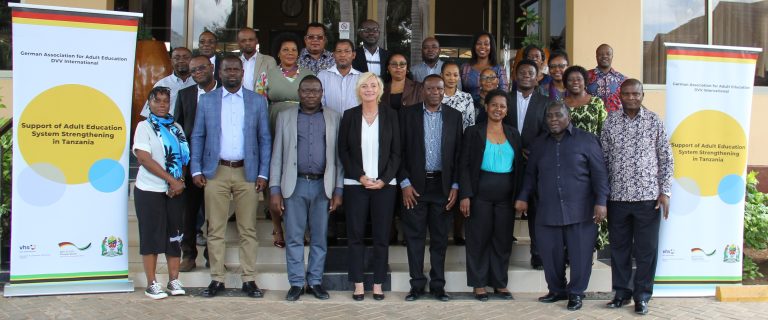Review of Tanzania's Integrated Community Based Adult Education Programme
16 August 2023 | Rita Kahurananga & Frauke Heinze | DVV International East Africa Regional Office, Dar es Salaam ALE

To respond more efficiently to the socio- economic situation of Youth and adults from the age of 15 years, the Tanzanian Ministry of Education Science and Technology (MoEST) in cooperation with DVV International are reviewing the Integrated Community Based Adult Education Programme (ICBAE). A Technical Working Group has been formed to lead the review process, comprising representatives from ministries, the Institute of Adult Education and the civil society education network, TENME. After a period of intensive work, the draft revised ICBAE programme guidelines were presented to key officials from the responsible Ministries on the 5th of August for their guidance and inputs.
The ICBAE programme is a non-formal Adult Learning and Education (ALE) programme which was developed in 1993. After an initial piloting phase, it has been implemented by the Ministry of Education countrywide since 1997 to help ensure that every out-of-school youth and adult has access to basic education and skills development through functional literacy.
Background and Rationale of the ICBAE Programme
Despite the success recorded in the 1980s, illiteracy is an ongoing challenge in Tanzania. For example, in 2015, 77.9% of adults were literate. However, the results of the 2022 Census showed a decline, with only 72.8%. The census also indicates a high level of population growth that has implications for both the formal and informal education systems, which must absorb greater numbers of youth and adult learners. These learners also need livelihoods opportunities after their studies. The National Bureau of Statistics & the Office of the Chief Government Statistician Zanzibar (2015), indicate that adolescent girls and young women with no formal education are five times more likely to become pregnant (52%) compared to those who have higher education (10%). Teenage childbearing also varies by economic status, ranging from 13% among adolescents in the wealthiest groups to 42% among those in the poorest households.
Some Potential Outcomes of the Review
After the review phase, it is foreseen that this programme will offer basic education and skills development through functional literacy to youth and adults. Key components of the programme include:
- Literacy and post-literacy support,
- Life skills, parenting and civic education,
- Entrepreneurship and business skills,
- Digital technologies,
- Agriculture and livestock education, and
- Health and hygiene education.
Within the ICBAE programme, learning will be carried out in spaces considered suitable and convenient by the learners themselves. A well-designed learning space enables adult learners to immerse themselves in a richer and more meaningful learning experience. Below are some further expected outcomes of the programme:
- Learners will be placed at the centre of the learning process, promoting commitment and responsibility by enabling learners to make decisions about the goals and activities of the programme.
- Provision of education relevant to learners’ everyday lives so that they are better-informed about topics such as health, hygiene, infectious diseases, clean water, etc.
- Enhancement of learners’ literacy and numeracy skills and their application for socio-economic transformation.
- Provision of competence-based vocational skills development to conduct income-generating activities through which learners will be able to sustain themselves.
- Learners will be supported to enhance their critical thinking and problem-solving skills so that they are able to identify and address social, political, and economic issues.
- Improved work towards the achievement of gender equity and inclusion.
- An increase in equitable employability contributing to poverty reduction.